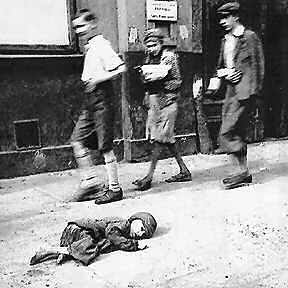
The image to the left is of a child laying in the streets of Warsaw sometime in the 1940s, dying. It is the picture I promised to show you last time. I have borrowed it from a fellow named Martin Frost who has it here. I highly doubt he has the sole rights to it and cannot bother to track the owner. I need to use it for this post. Anyway, I learned of Jewish ghettos, a good example of which is the Warsaw Ghetto apparently pictured here, in my Jewish Studies 101 class with Sarah Hammerschlag during my senior year at Williams. When I was writing a paper for the class, I went online to read a bit more about the conditions under which Jews lived in 1940s Europe. I came across this picture of this little girl laying on the streets dying. It is one of the saddest images I have ever seen. For one, I adore children. I think children are wonderful little creatures that deserve all the love and affection any society can lavish upon them. Nothing makes me happier than to see a happy child, and nothing enrages me more than to see a child being abused. Secondly, I have this weird thing about death. I think that people deserve some form of company in their final hours, and think it extremely sad for someone to die alone. So when I came across this picture of this tiny child curled up, dying, alone, you can imagine that it made me very sad.
I think the image represents a powerful lesson for what can happen when we as a society begin to dehumanize people. When I was young, one of my cousins decided she'd major in history in high school. I thought, what a strange choice. Why would anyone major in history? She tried to explain how important history is, and how mankind has always repeated history, over and over, and if we cannot learn from the past, the future would be a dark place. I didn't buy it at the time, but as I grew older, I began to understand what she was talking about.
When the Iranian president Mahmoud Ahmadinejad and others hold their conferences denying the Holocaust, they're in effect shooting themselves in the foot. More and more when I read the papers and listen to the news, I am realizing that there is a growing distrust of Muslims and Arabs here in the West. As a matter of fact, Obama's Muslim connection, albeit very weak (his father, who left the family early in his childhood was a Muslim before leaving the religion) has been used against him publicly. Of the dozens of times I've heard the topic addressed, only once did I hear anyone say, "so what if he's a Muslim?" It's becoming increasingly acceptable to publicly scorn anything Islamic in America. And if we as a society are not careful, maybe images like this one may not be a thing of the past, but, Allah forbid, a thing of the future.
